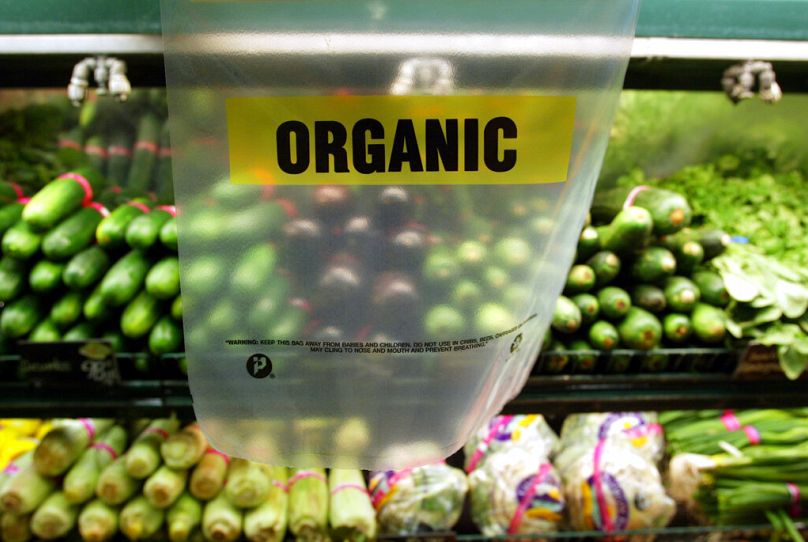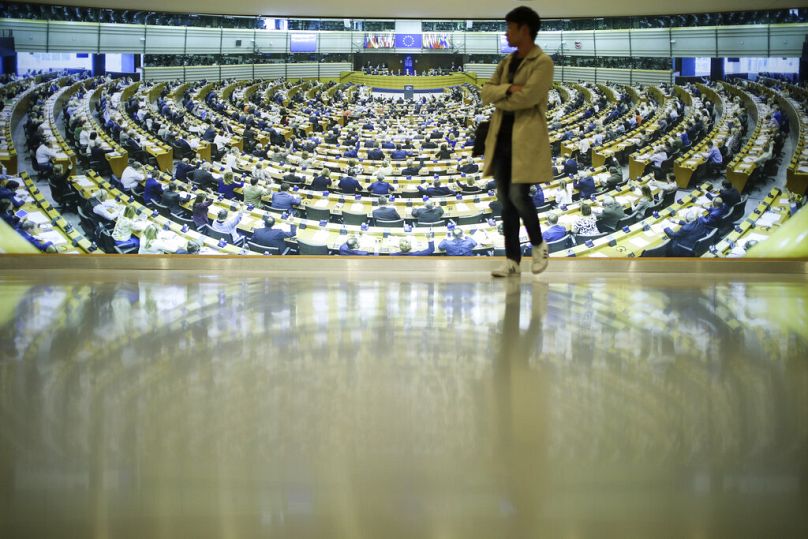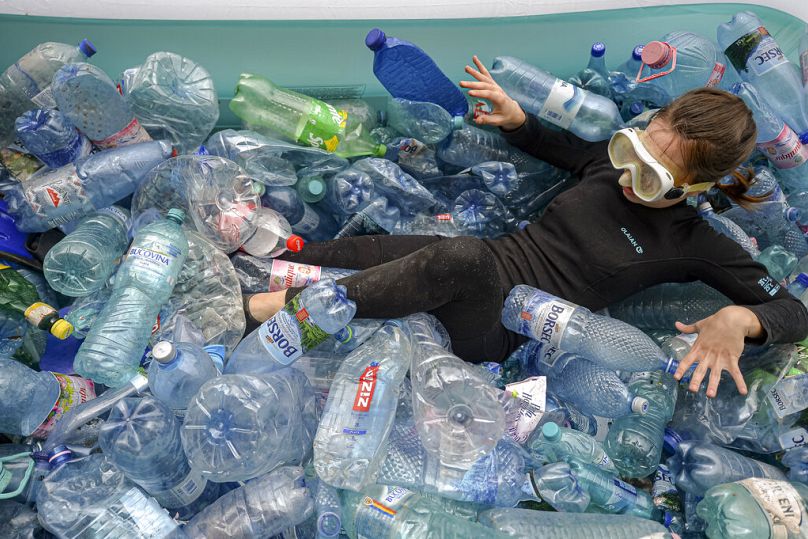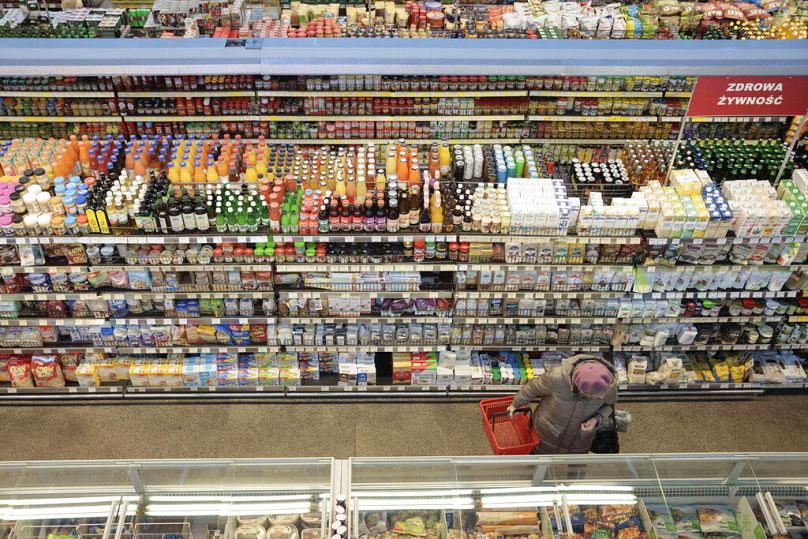If passed, the law will ban generic claims — from "environmentally-friendly" and "eco" to "natural" and "biodegradable" — from being made without evidence. This is a much-needed step in the right direction, Ana Birliga Sutherland writes.
Regulators are finally cracking down on advertisers making false green claims, in a series of moves dubbed the end of the "greenwashing era".
 ADVERTISEMENT
ADVERTISEMENT
 ADVERTISEMENT
ADVERTISEMENT
These claims — from the vague ("all natural") to the hard-to-verify and seemingly omnipresent ("carbon neutral")—often mislead increasingly climate-conscious consumers.
The desire for more environmentally friendly goods is growing rapidly, with nearly 90% of Gen X consumers willing to spend more on sustainable products, compared to 34% in 2020.
And at the same time, the circular economy — an economic model that designs out waste, cuts material use and keeps materials in the loop for as long as possible — is becoming increasingly mainstream.
This begs the question: as greenwashing is kicked to the kerb, does this allow space for its more insidious cousin — circular washing — to creep in?
A ban on vague, misleading and unfounded claims is on its way
Keen to profit from consumers’ changing ethos, brands are adding circular claims to their arsenals.
These can be even more harmful: what’s branded as "circular" isn’t always good for the environment, especially if it features an over-reliance on recycling rather than substantial cuts in material use.
Advertisers can tend to focus on a single aspect of their product or service, but a holistic approach to circularity is most effective: claims that a product contains recycled materials, for example, may not show the whole picture, drawing attention away from other not-so-circular features.
The EU’s move to tackle greenwashing has drawn attention from proponents and critics alike: the proposal for the new "Green Claims" directive was voted in plenary with a huge majority, setting the foundation for a finalised law in the coming months.
If passed, it’ll ban generic claims — from "environmentally-friendly" and "eco" to "natural" and "biodegradable" — from being made without evidence, requiring brands to verify their products’ merits through third-party certification schemes.
This is a much-needed step in the right direction: a 2020 study found that a massive 53% of green claims were vague, misleading or unfounded, with a further 40% entirely unsubstantiated.
But will the directive take on circular washing — and consequently encourage true circularity as well?
The Green Claims directive will cover all manner of sins — circular washing included
The proposed directive rides along a wave of initiatives that aims to make "environmentally sustainable products and business models the norm, and not the exception"; complemented by circular design interventions, an upcoming ban on planned obsolescence and another proposed directive on common rules for the repair of goods.
The need to tackle greenwashing has emerged as a priority under the EU’s Circular Economy Action Plan and also supports the goals of the European Green Deal — and to this end, the directive succeeds at covering any number of false environmental claims and boasts the much-needed nuance.
The sustainability of a part does not equal the sustainability of the whole, but certain aspects — recyclability, repairability, and durability, for example — can be featured as benefits, if substantiated.
The proposed directive highlights the "fast-changing area of environmental claims by means of a single method", as well as its flaws: rolling out a single method, like environmental footprinting, may not do credit to a product’s genuine performance, whether positive or negative.
Claims omitting hidden trade-offs might mislead consumers
This sentiment has been echoed by environmental NGOs, which have expressed that single environmental scores mustn't be used to "hide trade-offs".
This is addressed in further detail by the directive, which notes that consumers could be misled if claims point to environmental benefits while omitting the fact that those benefits lead to hidden trade-offs.
For example, an environmental claim on textiles containing polymer from recycled PET bottles, if the recycled material may be otherwise used within a closed-loop recycling system for food packaging — the more beneficial option from a circular economy perspective.
While bottle-to-bottle recycling is the ideal, the market for recycled plastic fabrics is growing — and not always first discerning whether higher-value reuse or recycling options are feasible.
The proposed directive calls for nuance in determining products’ environmental — or circular — performance, noting that comparative claims between similar products with different raw materials and production processes must take the most relevant life-cycle stages into account.
For example: impacts within the agriculture and forestry industries are relevant for bio-based plastics, while oil extraction comes to the fore for fossil-based plastics.
While bio-based plastics certainly can be greener than their fossil-based counterparts — particularly in terms of their carbon footprint — concerns about the land-use requirements needed to grow the plants potentially competing with food and feed production and the potential risk of increased monocropping have come to the fore.
These are the kinds of trade-offs the proposed directive hopes to shine a light on, especially as these claims are rising and are more often than not misleading.
The caveat: tackling false claims may lead to green — or circular — ’hushing’
Can a good thing go too far? Critics of the directive have honed in on the potential for "greenhushing": brands deciding not to declare all the sustainable steps they’re taking due to steep costs or even fear of legal pushback for making (unintentional) false claims.
While the proposed directive does mention protection for SMEs — noting that EU member states should provide adequate information on how to comply, as well as targeted, specialised training and financial support — smaller businesses may stand to lose out without knowledge of the right steps forward.
While navigating new legislative waters may prove tricky, transparency and willingness to learn will be key along the way.
Additionally, companies should leverage their preparation for the CSRD. Adopted in late 2022, the EU’s Corporate Sustainability Reporting Directive will require nearly 50,000 companies across Europe to report on sustainability, resource use, and circular economy performance.
Many companies’ sustainability-related data will come to the surface, providing new opportunities for transparency — but also showing where there’s room for improvement.
Data collected for the CSRD can help companies make informed decisions about what to report and may open them up to attracting new customers and uncovering new ways of doing business.
It’ll also lay bare businesses’ transgressions, making it more difficult to hide behind false claims.
The EU won’t be a safe haven for unsustainable businesses
While the Directive’s efficacy at quelling greenwashing and circular washing has yet to be seen, its existence in the broader legislative landscape of new EU bills is promising.
With sustainability reporting requirements just over the horizon (businesses will be required to report on circularity from 2025) and a new ecodesign regulation — which will ban planned obsolescence — receiving broad support in parliament, it seems the EU is shaping a new standard for companies doing business across the continent.
The next step: making this new standard the new normal.
Ana Birliga Sutherland is Writer and Editor at Circle Economy, a global impact organisation with an international team of experts based in Amsterdam.
At Euronews, we believe all views matter. Contact us at view@euronews.com to send pitches or submissions and be part of the conversation.














